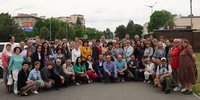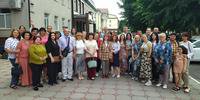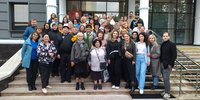The Case of Gushchin in Mayskiy
Filter
- #
The Maisky Interdistrict Investigation Department of the Investigative Committee of the Investigative Committee of the Russian Federation for the Kabardino-Balkarian Republic is initiating a criminal case against Kirill Gushchin for his faith under Part 1 of Article 282.2 of the Criminal Code of the Russian Federation. The case is assigned No. 12002830005000024.
- #
At 7:20 a.m., Kirill Gushchin goes into the garage to get his car to go to work. Suddenly, the exit is blocked by a car, from which security forces in masks and with machine guns come out. Among them is Sergey Svetikov, an employee of the FSB for the CBD, whom believers and their lawyers have repeatedly accused of falsifying operational materials. Gushchin is handcuffed and escorted to the apartment where his wife is.
During the search, the couple is restricted in moving around the apartment. One of the security officials closes himself in the bedroom, and, coming out of there, does not allow anyone to go there. Soon in this room they find a planted copy of the "Holy Scripture - New World Translation", one of the editions of which was banned for distribution in Russia. Svetikov, in turn, throws books and brochures included in the list of extremist materials into another room. Operatives make video filming selectively. Electronic devices, personal records and flash drives are seized from the spouses.
After 4 hours, the Gushchins were taken to the police department, and then to the Investigative Committee for interrogation. Spouses use Article 51 of the Constitution, which allows them not to testify against themselves and their loved ones.
- #
Lieutenant of Justice A. Yakhtanigov, an investigator for particularly important cases of the Maisky Interdistrict Investigation Department of the Investigative Directorate of the Investigative Committee of the Russian Federation for the Kabardino-Balkarian Republic, initiates a criminal case against Kirill Gushchin under Part 1.1 of Article 282.2 of the Criminal Code of the Russian Federation. The accusation is based on the testimony of a secret witness "Filatova", who secretly made an audio recording of the services.
According to the investigation, the believer "through active actions, namely persuasion, calls for religious unity ... gradually transformed the worldview ... [and also] took active actions, expressed in the conduct of divine services, consisting of the sequential performance of songs ... and prayers to Jehovah God." Kirill Gushchin is also accused of discussing such topics as "Love that never passes", "Love overcomes everything", "Walk in love", "The unquenchable love of our world brotherhood", as well as the performance of the songs "God is love", "God's example of love", "Receive each other cordially", etc.
The criminal case is assigned No. 12102830005000013. It is associated with case No. 12002830005000024.
- #
Investigator A. Yakhtanigov officially prosecutes Kirill Gushchin as a defendant in a crime under Part 1 and Part 1.1 of Article 282.2 of the Criminal Code of the Russian Federation.
A new criminal case under Part 2 of Article 282.2 of the Criminal Code against his wife, Svetlana Gushchina, as well as Zareta Ortanova, Svetlana Dubovkina, Olga Shulgina and Aksana Dominova is separated from the criminal case against Kirill Gushchin. The accusation is based on the testimony of the same "Filatova".
The investigator also singles out materials under Article 308 of the Criminal Code of the Russian Federation on the fact of refusing to testify and attracts 7 women and 2 men from Mayskoye under it - this is how he interprets the fact that they used Article 51 of the Constitution of the Russian Federation.
- #
The head of the Maisky Interdistrict Investigative Directorate of the Investigative Committee of the Russian Federation for the Kabardino-Balkarian Republic, A. A. Ashkhotov, decides to return the criminal case to the investigator A. M. Yakhtanigov to eliminate the identified deficiencies. The accused insisted on this, arguing that the detective of the FSB of Russia for the CBR, S. A. Svetikov, who had previously been convicted of falsifying the materials of criminal cases against believers, put pressure on prosecution witnesses.
- #
The case of Kirill Gushchin is transferred to the Maisky District Court of the Kabardino-Balkarian Republic. It is considered by judge Ruslan Atakayev.
- #
A closed court session is being held in the Maysky District Court of the Kabardino-Balkarian Republic. The prosecutor insists that all subsequent hearings should also be held behind closed doors.
- #
The court is questioning witnesses in the Gushchin case.
Among those interrogated were employees of the Center for Combating Extremism and FSB operatives, including Sergey Svetikov, who had previously been convicted of abuse of office, as well as falsification of operational materials.
- #
The defense is filing two motions. The first is about conducting an examination to identify fingerprints on the Bible and religious literature seized from Gushchin during the search, since the believer claims that they do not belong to him and were planted. The second is about the inclusion of photographic materials provided by the defendants in the case.
- #
The court interrogates a forensic expert of the Ministry of Internal Affairs for the Maysky district of the KBR. It confirms that it is possible to identify fingerprints on the seized literature and DNA fingerprinting.
The prosecution objects, arguing that the law enforcement officers who seized publications during the search of Gushchin's house were without gloves and could have left their fingerprints on books and brochures. However, the defense draws attention to the fact that during the interrogation in court, all law enforcement officers confirmed that they worked with gloves.
- #
6 people come to support the defendant.
The court satisfies the request of the defense to attach to the case all the photographic materials provided by it.
- #
Forensic experts inform the court that it is not possible to identify the fingerprints on the Bible and printed publications that were planted on the believer.
The court listens to secret recordings of worship services.
The defense submits a petition with a request to make a request to the administration of Georgievsk about the dates of worship in the village of Nezlobnaya, since these religious events were coordinated with the local administration.
- #
Interrogation of the defendant. The believer reads out his written testimony, which the judge attaches to the case. Kirill Gushchin refuses to answer additional questions from the judge and prosecutor, using Article 51 of the Constitution of the Russian Federation.
- #
The court reads out the answer from the administration of Georgievsk: the administration does not have information about the dates of worship.
- #
The defense file a petition for the appointment of a comprehensive psychological and linguistic religious forensic examination, and also challenges the expert religious scholar Astakhova. The court postpones the resolution of the defense's petition until Astakhova is interrogated at the hearing, as well as to provide an opportunity for the defense to confirm the arguments about the expert's incompetence.
- #
At the hearing, an expert linguist Anna Galkina is interrogated, who explains that in the psychological and linguistic conclusion, an organization means a group of people united by common interests, goals, and a common program. By involvement, the linguist understands the persuasion of a person to take part in a certain activity, in particular, involvement, in her opinion, are training videos.
The defense provides information from open sources confirming the incompetence of the expert Astakhova.
- #
Religious expert Larisa Astakhova is being interrogated. When asked by Kirill Gushchin whether all Jehovah's Witnesses are members of legal entities, Astakhova replies that they are not, and adds: "Faith is not forbidden, organization is forbidden ... Believers can continue to practice their religion without having a legal entity."
The defense notes that "in the course of pre-trial proceedings, psychological and linguistic research was carried out by FSB officers who do not have special knowledge in the field of religious studies; Legal questions were put before them." In addition, "it follows from the conclusion of the expert Astakhova that she does not understand the essence of the religion of Jehovah's Witnesses." The defendant also draws attention to the fact that the conclusions of the examination give a legal assessment of his actions, although this is not within the competence of the expert.
Having listened to the arguments of the defendant and the lawyer about the incompetence of the expert, the court satisfies their request for a comprehensive psychological, linguistic and religious examination.
- #
The court decides to involve religious scholar Ekaterina Elbakyan, a member of the European Association for the Study of Religion, in a comprehensive examination.
- #
The results of the religious examination are announced.
A prosecution witness who previously testified in court is being questioned. The prosecutor is interested in Gushchin's role in organizing worship services for Jehovah's Witnesses.
- #
The prosecutor requests 7 years of imprisonment for Kirill Gushchin in a general regime colony. He also asks the court to send the believer into custody even before the decision is made, but the court leaves him under recognizance not to leave.
The defense is filing a motion to include in the case file the decision of the ECHR in the case of Jehovah's Witnesses from Taganrog. The court refuses.
- #
"I am not an extremist because I am a Jehovah's Witness," Kirill Gushchin delivers his final statement in court.
More than 60 people come to the courthouse to support the believer. 34 of them are allowed to attend the meeting.
The last word of the defendant Kirill Gushchin in Mayskoye - #
- #
The prosecutor submits an appeal against the acquittal of Kirill Gushchin. He requests that the verdict be quashed and that the case be returned for a new trial by a different court. According to the state prosecutor, the court gave an incorrect assessment of the evidence examined.
- #
- #
Prosecutor D. G. Zhukov files a cassation submission in the criminal case against Kirill Gushchin. In it, he asks to cancel the decisions of the courts of first and appellate instances and to send the case for a new trial.
- #
The Prosecutor's Office of the Kabardino-Balkarian Republic, represented by the Acting District Prosecutor A.G. Antyshev, makes an official apology to Kirill Gushchin in connection with the unjustified criminal prosecution under Part 1 of Article 282.2 of the Criminal Code of the Russian Federation.
- #


